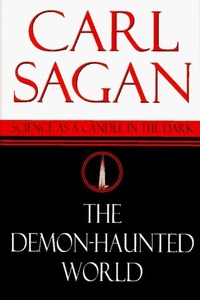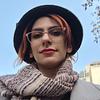Take a photo of a barcode or cover
challenging
funny
hopeful
informative
inspiring
reflective
medium-paced
Still one of my absolute favorite books. It is alarming that parts of this book remain so relevant, about 30 years after it was published. Carl Sagan was prescient in his description of the dangers to humanity caused by anti-intellectualism and science illiteracy.
Cary Elwes does a phenomenal job in his performance, as does Seth MacFarlane. I highly recommend this audiobook to anyone with an interest in the need for critical thinking when confronting the mysteries of the universe and the actions of society.
Cary Elwes does a phenomenal job in his performance, as does Seth MacFarlane. I highly recommend this audiobook to anyone with an interest in the need for critical thinking when confronting the mysteries of the universe and the actions of society.
challenging
hopeful
informative
slow-paced
چقدر نویسنده به شیوه خودش عاشق علمه و چه مدل خوبی برا انتقال و انتشار این حسش داره.
توش راجع به تاریخ علم و تاریخ برخورد با چیزای علمی و غیر علمی صحبت کرده بود ؛ به طور مشخصا جهت داری از زیبایی های علم(نه اینکه زیبا نباشه ولی خب اگه یکم خونده باشید ازش متوجه میشوید منظورمو) گفته بود ؛ و آها راجع به سودوساینس صحبت کرده بود. راجع به اینرسی آدم ها به دانسته ها و روش هاشون گفته بود.
یه سری حرف هاش و مدل نوشتنش رو خیلی دوست داشتم.
یکم از حرفاش هم اینجا بذارم:
▪ In a typical passage Hippocrates wrote: "Men think epilepsy divine, merely because they do not understand it. But if they called everything divine which they do not understand, why, there would be no end of divine things."
▪ While medicine in the Islamic world flourished, what followed in Europe was truly a dark age. Much knowledge of anatomy and surgery was lost. Reliance on prayer and miraculous healing abounded. Secular physicians became extinct. Chants, potions, horoscopes, and amulets were widely used.
▪ If we long to believe that the stars rise and set for us, that we are the reason there is a Universe, does science do us a disservice in deflating our conceits?
▪ Nietzsche mourns the loss of "man's belief in his dignity, his uniqueness, his irreplace-ability in the scheme of existence "
▪ Plainly there is no way back Like it or not, we are stuck with science. We had better make the best of it. When we finally come to terms with it and fully recognize its beauty and its power, we will find, in spiritual as well as in practical matters, that we have made a bargain strongly in our favor
▪ These are all instances of pseudoscience. They purport to use the methods and findings of science, while in fact they are faithless to its nature—often because they are based on insufficient evidence or because they ignore clues that point the other way. They ripple with gullibility. With the uninformed cooperation (and often the cynical connivance) of newspapers, magazines, book publishers, radio, television, movie producers, and the like, such ideas are easily and widely
▪ So pseudoscience in America is part of a global trend. Its causes, dangers, diagnosis and treatment are likely to be similar everywhere.
▪ no one interested in what religions are and how they begin can ignore them
▪ The world presents us with nearly insurmountable problems. A wide variety of solutions are offered, some of very limited worldview, some of portentous sweep.
▪ We've arranged a global civilization in which most crucial elements—transportation, communications, and all other industries; agriculture, medicine, education, entertainment, protecting the environment; and even the key democratic institution of voting —profoundly depend on science and technology. We have also arranged things so that almost no one understands science and technology. This is a prescription for disaster. We might get away with it for a while, but sooner or later this combustible mixture of ignorance and power is going to blow up in our faces.
▪ Any illness or storm, anything out of the ordinary, was popularly attributed to witchcraft.
▪ For much of our history, we were so fearful of the outside world, with its unpredictable dangers, that we gladly embraced anything that promised to soften or explain away the terror. Science is an attempt, largely successful, to understand the world, to get a grip on things, to get hold of ourselves, to steer a safe course. Microbiology and meteorology now explain what only a few centuries ago was considered sufficient cause to burn women to death.
▪ Avoidable human misery is more often caused not so much by stupidity as by ignorance, particularly our ignorance about ourselves. I worry that, especially as the Millennium edges nearer, pseudoscience and superstition will seem year by year more tempting, the siren song of unreason more sonorous and attractive. Where have we heard it before? Whenever our ethnic or national prejudices are aroused, in times of scarcity, during challenges to national self-esteem or nerve, when we agonize about our diminished cosmic place and purpose, or when fanaticism is bubbling up around us—then, habits of thought familiar from ages past reach for the controls.
▪ The candle flame gutters. Its little pool of light trembles. Darkness gathers. The demons begin to stir
▪ When it gets complicated, that's usually because the world is complicated—or because we're complicated. When we shy away from it because it seems too difficult (or because we've been taught so poorly), we surrender the ability to take charge of our future. We are disenfranchised. Our self-confidence erodes.
▪ But when we pass beyond the barrier, when the findings and methods of science get through to us, when we understand and put this knowledge to use, many feel deep satisfaction
▪ Science is not only compatible with spirituality; it is a profound source of spirituality
▪ Science may be hard to understand. It may challenge cherished beliefs. When its products are placed at the disposal of politicians or industrialists, it may lead to weapons of mass destruction and grave threats to the environment. But one thing you have to say about it: It delivers the goods.
▪ There are no forbidden questions in science, no matters too sensitive or delicate to be probed, no sacred truths.
▪ Faith is clearly not enough for many people. They crave hard evidence, scientific proof. They long for the scientific seal of approval, but are unwilling to put up with the rigorous standards of evidence that impart credibility to that seal. What a relief it would be: doubt reliably abolished! Then, the irksome burden of looking after ourselves would be lifted. We're worried —and for good reason — about what it means for the human future if we have only ourselves to rely upon.
◆ Chapter 2
▪ what's the difference between an invisible, incorporeal, floating dragon who spits heatless fire and no dragon at all? If there's no way to disprove my contention, no conceivable experiment that would count against it, what does it mean to say that my dragon exists?
▪ Your inability to invalidate my hypothesis is not at all the same thing as proving it true. Claims that cannot be tested, assertions immune to disproof are veridically worthless, whatever value they may have in inspiring us or in exciting our sense of wonder. What I'm asking you to do comes down to believing, in the absence of evidence, on my say-so
◆ Chapter 3
▪ One of the saddest lessons of history is this: If we've been bamboozled long enough, we tend to reject any evidence of the bamboozle. We're no longer interested in finding out the truth. The bamboozle has captured us. It's simply too painful to acknowledge, even to ourselves, that we've been taken. Once you give a charlatan power over you, you almost never get it back. So the old bamboozles tend to persist as the new ones rise.
▪ In every such society, there is a cherished world of myth and metaphor which co-exists with the workaday world
▪ In a life short and uncertain, it seems heartless to do anything that might deprive people of the consolation of faith when science cannot remedy their anguish. Those who cannot bear the burden of science are free to ignore its precepts. But we cannot have science in bits and pieces, applying it where we feel safe and ignoring it where we feel threatened—again, because we are not wise enough to do so. Except by sealing the brain off into separate airtight compartments, how is it possible to fly in airplanes, listen to the radio or take antibiotics while holding that the Earth is around 10,000 years old or that all Sagittari-ans are gregarious and affable?
▪ we cannot have science in bits and pieces, applying it where we feel safe and ignoring it where we feel threatened.
▪ The impediment to scientific thinking is not, I think, the difficulty of the subject. Complex intellectual feats have been mainstays even of oppressed cultures. Shamans, magicians, and theologians are highly skilled in their intricate and arcane arts. No, the impediment is political and hierarchical. In those cultures lacking unfamiliar challenges, external or internal, where fundamental change is unneeded, novel ideas need not be encouraged. Indeed, heresies can be declared dangerous; thinking can be rigidified; and sanctions against impermissible ideas can be enforced—all without much harm.
▪ Science is an astonishment and a delight. Every time a spacecraft flies by a new world, I find myself amazed. Planetary scientists ask themselves: "Oh, is that the way it is? Why didn't we think of that?" But nature is always more subtle, more intricate, more elegant than what we are able to imagine.
▪ Given our manifest human limitations, what is surprising is that we have been able to penetrate so far into the secrets of Nature
◆ Chapter 4
▪ Except for firsthand experience, almost everything we knew was passed on by word of mouth. As in the children's game "Telephone," over tens and hundreds of generations, information would slowly be distorted and lost.
▪ Books, purchasable at low cost, permit us to interrogate the past with high accuracy; to tap the wisdom of our species; to understand the point of view of others, and not just those in power; to contemplate—with the best teachers —the insights, painfully extracted from Nature, of the greatest minds that ever were, drawn from the entire planet and from all of our history. They allow people long dead to talk inside our heads. Books can accompany us everywhere. Books are patient where we are slow to understand, allow us to go over the hard parts as many times as we wish, and are never critical of our lapses. Books are key to understanding the world and participating in a democratic society.
▪ Even a casual scrutiny of history reveals that we humans have a sad tendency to make the same mistakes again and again.
▪ We're afraid of strangers or anybody who's a little different from us. When we get scared, we start pushing people around. We have readily accessible buttons that release powerful emotions when pressed. We can be manipulated into utter senselessness by clever politicians. Give us the right kind of leader and, like the most suggestible subjects of the hypnotherapists, we'll gladly do just about anything he wants —even things we know to be wrong. The framers of the Constitution were students of history. In recognition of the human condition, they sought to invent a means that would keep us free in spite of ourselves.
▪ If we can't think for ourselves, if we're unwilling to question authority, then we're just putty in the hands of those in power. But if the citizens are educated and form their own opinions, then those in power work for us.
▪ In every country, we should be teaching our children the scientific method and the reasons for a Bill of Rights. With it comes a certain decency, humility and community spirit. In the demon-haunted world that we inhabit by virtue of being human, this may be all that stands between us and the enveloping darkness.
توش راجع به تاریخ علم و تاریخ برخورد با چیزای علمی و غیر علمی صحبت کرده بود ؛ به طور مشخصا جهت داری از زیبایی های علم(نه اینکه زیبا نباشه ولی خب اگه یکم خونده باشید ازش متوجه میشوید منظورمو) گفته بود ؛ و آها راجع به سودوساینس صحبت کرده بود. راجع به اینرسی آدم ها به دانسته ها و روش هاشون گفته بود.
یه سری حرف هاش و مدل نوشتنش رو خیلی دوست داشتم.
یکم از حرفاش هم اینجا بذارم:
▪ In a typical passage Hippocrates wrote: "Men think epilepsy divine, merely because they do not understand it. But if they called everything divine which they do not understand, why, there would be no end of divine things."
▪ While medicine in the Islamic world flourished, what followed in Europe was truly a dark age. Much knowledge of anatomy and surgery was lost. Reliance on prayer and miraculous healing abounded. Secular physicians became extinct. Chants, potions, horoscopes, and amulets were widely used.
▪ If we long to believe that the stars rise and set for us, that we are the reason there is a Universe, does science do us a disservice in deflating our conceits?
▪ Nietzsche mourns the loss of "man's belief in his dignity, his uniqueness, his irreplace-ability in the scheme of existence "
▪ Plainly there is no way back Like it or not, we are stuck with science. We had better make the best of it. When we finally come to terms with it and fully recognize its beauty and its power, we will find, in spiritual as well as in practical matters, that we have made a bargain strongly in our favor
▪ These are all instances of pseudoscience. They purport to use the methods and findings of science, while in fact they are faithless to its nature—often because they are based on insufficient evidence or because they ignore clues that point the other way. They ripple with gullibility. With the uninformed cooperation (and often the cynical connivance) of newspapers, magazines, book publishers, radio, television, movie producers, and the like, such ideas are easily and widely
▪ So pseudoscience in America is part of a global trend. Its causes, dangers, diagnosis and treatment are likely to be similar everywhere.
▪ no one interested in what religions are and how they begin can ignore them
▪ The world presents us with nearly insurmountable problems. A wide variety of solutions are offered, some of very limited worldview, some of portentous sweep.
▪ We've arranged a global civilization in which most crucial elements—transportation, communications, and all other industries; agriculture, medicine, education, entertainment, protecting the environment; and even the key democratic institution of voting —profoundly depend on science and technology. We have also arranged things so that almost no one understands science and technology. This is a prescription for disaster. We might get away with it for a while, but sooner or later this combustible mixture of ignorance and power is going to blow up in our faces.
▪ Any illness or storm, anything out of the ordinary, was popularly attributed to witchcraft.
▪ For much of our history, we were so fearful of the outside world, with its unpredictable dangers, that we gladly embraced anything that promised to soften or explain away the terror. Science is an attempt, largely successful, to understand the world, to get a grip on things, to get hold of ourselves, to steer a safe course. Microbiology and meteorology now explain what only a few centuries ago was considered sufficient cause to burn women to death.
▪ Avoidable human misery is more often caused not so much by stupidity as by ignorance, particularly our ignorance about ourselves. I worry that, especially as the Millennium edges nearer, pseudoscience and superstition will seem year by year more tempting, the siren song of unreason more sonorous and attractive. Where have we heard it before? Whenever our ethnic or national prejudices are aroused, in times of scarcity, during challenges to national self-esteem or nerve, when we agonize about our diminished cosmic place and purpose, or when fanaticism is bubbling up around us—then, habits of thought familiar from ages past reach for the controls.
▪ The candle flame gutters. Its little pool of light trembles. Darkness gathers. The demons begin to stir
▪ When it gets complicated, that's usually because the world is complicated—or because we're complicated. When we shy away from it because it seems too difficult (or because we've been taught so poorly), we surrender the ability to take charge of our future. We are disenfranchised. Our self-confidence erodes.
▪ But when we pass beyond the barrier, when the findings and methods of science get through to us, when we understand and put this knowledge to use, many feel deep satisfaction
▪ Science is not only compatible with spirituality; it is a profound source of spirituality
▪ Science may be hard to understand. It may challenge cherished beliefs. When its products are placed at the disposal of politicians or industrialists, it may lead to weapons of mass destruction and grave threats to the environment. But one thing you have to say about it: It delivers the goods.
▪ There are no forbidden questions in science, no matters too sensitive or delicate to be probed, no sacred truths.
▪ Faith is clearly not enough for many people. They crave hard evidence, scientific proof. They long for the scientific seal of approval, but are unwilling to put up with the rigorous standards of evidence that impart credibility to that seal. What a relief it would be: doubt reliably abolished! Then, the irksome burden of looking after ourselves would be lifted. We're worried —and for good reason — about what it means for the human future if we have only ourselves to rely upon.
◆ Chapter 2
▪ what's the difference between an invisible, incorporeal, floating dragon who spits heatless fire and no dragon at all? If there's no way to disprove my contention, no conceivable experiment that would count against it, what does it mean to say that my dragon exists?
▪ Your inability to invalidate my hypothesis is not at all the same thing as proving it true. Claims that cannot be tested, assertions immune to disproof are veridically worthless, whatever value they may have in inspiring us or in exciting our sense of wonder. What I'm asking you to do comes down to believing, in the absence of evidence, on my say-so
◆ Chapter 3
▪ One of the saddest lessons of history is this: If we've been bamboozled long enough, we tend to reject any evidence of the bamboozle. We're no longer interested in finding out the truth. The bamboozle has captured us. It's simply too painful to acknowledge, even to ourselves, that we've been taken. Once you give a charlatan power over you, you almost never get it back. So the old bamboozles tend to persist as the new ones rise.
▪ In every such society, there is a cherished world of myth and metaphor which co-exists with the workaday world
▪ In a life short and uncertain, it seems heartless to do anything that might deprive people of the consolation of faith when science cannot remedy their anguish. Those who cannot bear the burden of science are free to ignore its precepts. But we cannot have science in bits and pieces, applying it where we feel safe and ignoring it where we feel threatened—again, because we are not wise enough to do so. Except by sealing the brain off into separate airtight compartments, how is it possible to fly in airplanes, listen to the radio or take antibiotics while holding that the Earth is around 10,000 years old or that all Sagittari-ans are gregarious and affable?
▪ we cannot have science in bits and pieces, applying it where we feel safe and ignoring it where we feel threatened.
▪ The impediment to scientific thinking is not, I think, the difficulty of the subject. Complex intellectual feats have been mainstays even of oppressed cultures. Shamans, magicians, and theologians are highly skilled in their intricate and arcane arts. No, the impediment is political and hierarchical. In those cultures lacking unfamiliar challenges, external or internal, where fundamental change is unneeded, novel ideas need not be encouraged. Indeed, heresies can be declared dangerous; thinking can be rigidified; and sanctions against impermissible ideas can be enforced—all without much harm.
▪ Science is an astonishment and a delight. Every time a spacecraft flies by a new world, I find myself amazed. Planetary scientists ask themselves: "Oh, is that the way it is? Why didn't we think of that?" But nature is always more subtle, more intricate, more elegant than what we are able to imagine.
▪ Given our manifest human limitations, what is surprising is that we have been able to penetrate so far into the secrets of Nature
◆ Chapter 4
▪ Except for firsthand experience, almost everything we knew was passed on by word of mouth. As in the children's game "Telephone," over tens and hundreds of generations, information would slowly be distorted and lost.
▪ Books, purchasable at low cost, permit us to interrogate the past with high accuracy; to tap the wisdom of our species; to understand the point of view of others, and not just those in power; to contemplate—with the best teachers —the insights, painfully extracted from Nature, of the greatest minds that ever were, drawn from the entire planet and from all of our history. They allow people long dead to talk inside our heads. Books can accompany us everywhere. Books are patient where we are slow to understand, allow us to go over the hard parts as many times as we wish, and are never critical of our lapses. Books are key to understanding the world and participating in a democratic society.
▪ Even a casual scrutiny of history reveals that we humans have a sad tendency to make the same mistakes again and again.
▪ We're afraid of strangers or anybody who's a little different from us. When we get scared, we start pushing people around. We have readily accessible buttons that release powerful emotions when pressed. We can be manipulated into utter senselessness by clever politicians. Give us the right kind of leader and, like the most suggestible subjects of the hypnotherapists, we'll gladly do just about anything he wants —even things we know to be wrong. The framers of the Constitution were students of history. In recognition of the human condition, they sought to invent a means that would keep us free in spite of ourselves.
▪ If we can't think for ourselves, if we're unwilling to question authority, then we're just putty in the hands of those in power. But if the citizens are educated and form their own opinions, then those in power work for us.
▪ In every country, we should be teaching our children the scientific method and the reasons for a Bill of Rights. With it comes a certain decency, humility and community spirit. In the demon-haunted world that we inhabit by virtue of being human, this may be all that stands between us and the enveloping darkness.
challenging
informative
reflective
slow-paced
hopeful
informative
inspiring
medium-paced
informative
inspiring
reflective
medium-paced
challenging
informative
medium-paced
A fascinating look at a problem that has only gotten worse in the 30 years since the book was published. Has made me realise I need to add more science books to my tbr.
challenging
informative
reflective
slow-paced
challenging
dark
hopeful
informative
inspiring
reflective
slow-paced
I would consider this to be one of the most important books I've ever read.
Prescient, damning, but hopeful.
Prescient, damning, but hopeful.
emotional
informative
inspiring
reflective
medium-paced






